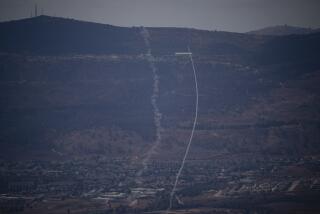Israel Offers Partial Pullout but Says Hamas Is Obstacle
JERUSALEM — In a bid to get peace efforts back on track after a week of bloodshed, Israeli military officials offered Sunday to withdraw from the West Bank town of Bethlehem and parts of the Gaza Strip in return for assurances that the Palestinian Authority would curb militant groups like Hamas.
But Hamas rejected an Egyptian delegation’s push for a six-month cease-fire. At a meeting at the Gaza City home of the group’s spiritual leader, Sheik Ahmed Yassin, the movement insisted on its “right to defend itself” and rejected the Middle East peace plan known as the “road map.”
Hamas said in a written statement that “the enemy wants to use the road map to destroy the Palestinian uprising and to turn the Palestinian people against each other.”
The Palestinian Authority has accepted the peace plan. But Nabil Amr, its minister of information, said Sunday’s offer caused concern that Israel would try to break the plan into parts, because the road map says Israel has to withdraw from all territories occupied since Sept. 28, 2000.
The Israeli offer came at a meeting of Israeli and Palestinian security officials after Palestinian security chief Mohammed Dahlan asked Israeli Maj. Gen. Amos Gilad to withdraw the troops.
Palestinian officials said recent events may force them to take control of areas in the Gaza Strip and the West Bank more quickly than originally planned.
An Israeli Cabinet minister who asked not to be identified said, “We are getting into logistical details of where the borders are and who is in charge of which areas.”
Israeli spokesman Avi Pazner said his nation was hopeful that it would be able to work out a cease-fire with the Palestinians, but worried about extremists.
“We are working on getting a cease-fire and we are especially working on withdrawing from the northern part of the Gaza Strip,” he said. “There is a big effort to get all things moving, but the key problem remains Hamas.”
Israeli Prime Minister Ariel Sharon refuses to rule out more strikes against Hamas, whose series of recent attacks included a suicide bus bombing that killed 17 Israelis. Israel staged a series of helicopter attacks last week, killing six Hamas members, wounding the Islamic militant group’s co-founder Abdulaziz Rantisi and killing about two dozen Palestinian bystanders, including eight children.
As talks continued Sunday, Israeli troops in Gaza killed a member of the Al Aqsa Martyrs Brigade, which is affiliated with Palestinian President Yasser Arafat’s Fatah movement. Meanwhile, Palestinians fired at least five Kassam missiles at settlements in Israel on Sunday, but they all missed.
The latest wave of violence -- and the most recent flurry of diplomatic activity -- came just as U.S. envoy John Wolf arrived here Sunday. He will meet with Palestinian and Israeli authorities to discuss ways to revive the ailing peace process.
His job may become more difficult, however, if Sharon follows through on a plan to present a list of 14 additional stipulations to the peace plan to the Israeli Knesset, or parliament, today. Palestinian and other Arab leaders have repeatedly said they would brook no amendments to the plan.
In light of the recent wave of violence and declining hopes for reconciliation, the Bush administration is facing calls to take more decisive action to move the peace process forward. On Sunday, Sen. Richard G. Lugar (R-Ind.), chairman of the Senate Foreign Relations Committee, said U.S. forces might have to help “root out terrorism” in the Middle East conflict by taking aim at Hamas.
In an interview on “Fox News Sunday,” Lugar said American forces, either acting alone or as part of an international force, could be used to quell Israeli and Palestinian disputes, “and, maybe even more important, to root out the terrorism that is at the heart of the problem.”
United Nations Secretary-General Kofi Annan and European Union officials recently suggested the possibility of sending peacekeepers, although the Jewish state remains firmly opposed to such intervention.
Two senators on the Select Committee on Intelligence reacted less than enthusiastically to Lugar’s remarks. On CBS’ “Face the Nation,” Sen. Pat Roberts (R-Kan.) said: “Most of us have been thinking about a peacekeeping force” -- to be placed after violence has calmed to ensure no new outbreaks. Involving U.S. troops in the hunt for terrorists “would be a rather dramatic step, to say the least.”
Sen. Carl Levin (D-Mich.) said, “Well, I think Congress would be very cautious.”
In Kennebunkport, Maine, President Bush said: “[Palestinian Authority] Prime Minister [Mahmoud] Abbas wants peace. Prime Minister Sharon wants peace. America wants peace. The European Union wants peace. But there are clearly killers who don’t. And for those of us who are interested in moving the process forward, we must combine our efforts to cut off all money, support for anybody who tries to sabotage the peace process.”
Within Israel, polls indicate support for the peace plan.
Still, even its smallest components seem to have been stymied. In accord with the peace agreement, Israel last week dismantled 10 unauthorized settlement outposts -- mobile homes and other landmarks placed by Jews to lay claim to disputed lands. But virtually overnight, Jewish settlers created six more.
Further talks are planned today between the Egyptian delegation and Palestinian groups.
*
Special correspondents Fayed abu Shammalah in Gaza and Maher Abukhater in Ramallah, West Bank, and Times staff writer Maura Reynolds in Kennebunkport contributed to this report.
More to Read
Sign up for Essential California
The most important California stories and recommendations in your inbox every morning.
You may occasionally receive promotional content from the Los Angeles Times.










